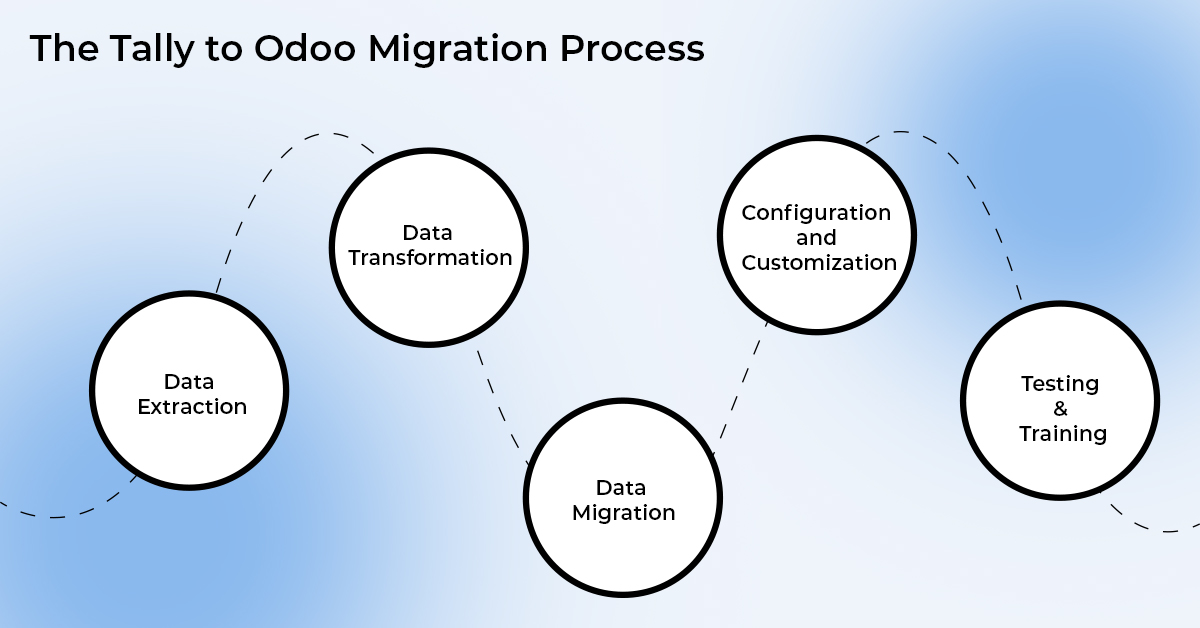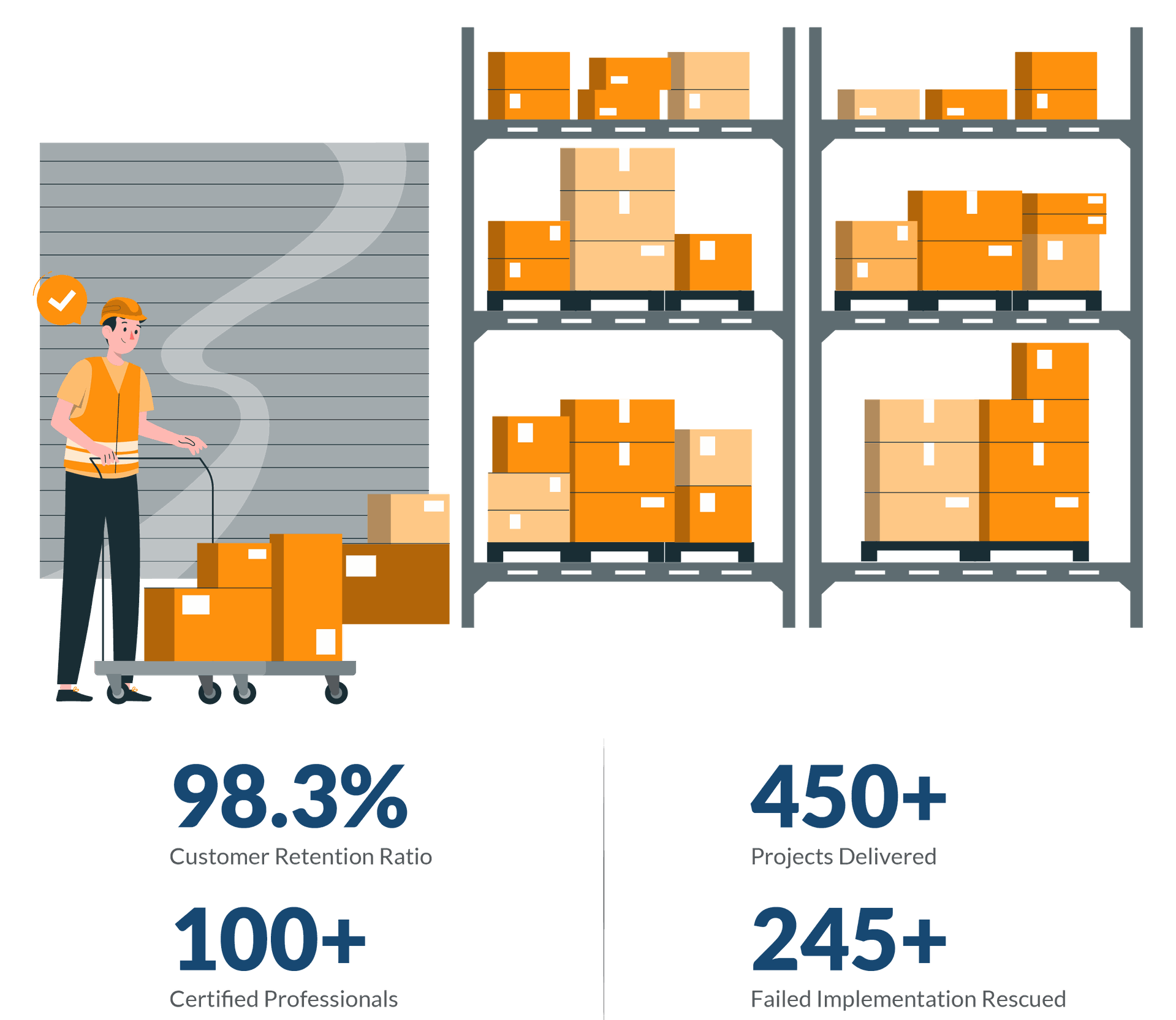Are you thinking of switching from Tally to Odoo? The process of switching can be complicated, but with the right help, it could mark a turnaround for your business. Before making this migration trip, you need to know the key differences between these two software systems.
Tally and Odoo are both widely used business software solutions. However, their features and capabilities vary to a considerable degree. Now, in order to enjoy the rich set of functionalities offered by Odoo, a lot of firms are considering migration from Tally.
If you're thinking about migrating from Tally to Odoo, then it is important for anyone contemplating such migration to know what the process entails and also have an understanding of how exactly this may affect their business. Here we will examine the peculiarities of Tally to Odoo migration and give you vital information to help you reach a decision. OK, let's take the plunge then and see how this migration can change your business.
What Is Tally?
Besides managing financial transactions, Tally is a widely used accounting software that also offers solutions for inventory management, payroll and taxes. Thanks to its easy-to-use interface and powerful capabilities, it has become a favourite of small and medium enterprises (SMEs). Tally provides functions such as accounting, inventory control, sales and purchase management and statutory compliance.
Features of Tally:
Financial Management
Tally is a superlative financial transaction manager, providing invoicing and billing as well.
Inventory Management
Tally offers an inventory control system with tools for recording stock levels, order processing and stock valuation.
Sales & Purchase Management
With Tally, businesses can simplify their order processing and invoicing procedures. They may track sales orders as well as purchase orders from vendors on the service.
Statutory Compliance
Tally helps businesses comply with various statutory requirements, including tax calculations, GST compliance, and generating statutory reports.
What Is Odoo?
Odoo is an all-in-one business management software that integrates various modules to streamline operations across different departments. It offers a wide range of functionalities, including accounting, inventory management, CRM, HR management, project management, and e-commerce. Odoo is highly customizable and scalable, making it suitable for businesses of all sizes and industries.
Features of Odoo
Accounting
Odoo provides comprehensive accounting features, including invoicing, bank reconciliation, financial reporting, and multi-currency support.
Inventory Management
Odoo offers advanced inventory management capabilities, including real-time tracking, stock valuation, automated replenishment, and barcode scanning.
CRM
Odoo's CRM module helps businesses manage their customer relationships, including lead generation, opportunity tracking, customer communication, and sales forecasting.
HR Management
Odoo's HR module covers various aspects of human resource management, including employee onboarding, attendance tracking, leave management, and performance evaluation.
Project Management
Odoo's project management module allows businesses to plan, execute, and monitor projects, including task management, resource allocation, and project cost tracking.
eCommerce
Odoo provides an integrated e-commerce platform that enables businesses to create and manage online stores, including product catalogue management, order processing, and payment integration.
Get FREE Consultation
Tabular Comparison of Tally & Odoo
Features |
Tally |
Odoo |
| Financial Management | Yes | Yes |
| Inventory Management | Yes | Yes |
| Sales and Purchase Management | Yes | Yes |
| Statutory Compliance | Yes | Yes |
| Accounting | No | Yes |
| CRM | No | Yes |
| HR Management | No | Yes |
| Project Management | No | Yes |
| eCommerce | No | Yes |
Reasons to Migrate from Tally to Odoo
- Enhanced Functionality: Unlike Tally, which primarily focuses on accounting functions, Odoo offers a wide range of modules that cater to different business needs. By migrating to Odoo, businesses can consolidate their operations onto a single platform, eliminating the need for multiple software applications and improving efficiency.
- Improved Reporting and Analytics: Odoo provides advanced reporting and analytics capabilities, allowing businesses to gain valuable insights into their financial and operational performance. With customizable dashboards and real-time data, decision-makers can make informed choices to drive business growth.
- Scalability and Flexibility: As businesses expand, their software requirements evolve. Tally may struggle to accommodate the growing needs of a rapidly expanding organization. On the other hand, Odoo's modular structure enables businesses to add or modify modules as per their changing requirements, ensuring scalability and flexibility.
- Integration Capabilities: Tally often operates as a standalone system, creating data silos and limiting collaboration between departments. Odoo, on the other hand, seamlessly integrates different business functions, fostering collaboration and improving overall efficiency.

The Tally to Odoo Migration Process
- Data Extraction: The first step in the migration process is to extract data from Tally, including financial records, inventory details, and customer information. This can be done using various tools and scripts specifically designed for Tally to Odoo migration.
- Data Transformation: Once the data is extracted, it needs to be transformed into a format compatible with Odoo. This involves mapping Tally fields to corresponding Odoo fields, ensuring data integrity and consistency during the migration.
- Data Migration: The changed data is then imported into the Odoo system via the import function. Validating and harmonizing the migrated data is, therefore, of the utmost importance.
- Configuration and Customization: The Odoo system has to be configured after data migration as per the specific needs of a business. This could involve creating modules, defining workflows and specifying user roles and permissions.
- Testing & Training: However, testing the migrated data and system functionality is essential before going live to identify any potential problems or discrepancies. There should also be training sessions to inform users of the new system and its capabilities.
What Are You Waiting For?
Contact us for a personalized meeting with our ERP Experts.
Challenges & Considerations:
- Data Compatibility: Differences in data structures between Tally and Odoo can create headaches during migration. Data must be compatible and consistent to prevent data loss or corruption.
- Customizations & Integrations: Migrating to Odoo may require additional effort and expertise if your business has tailored its Tally system or integrated it with other software applications.
- Change Management: For an organization, switching from one software system to another is a very big change. Therefore, appropriate change management procedures must be followed to make the transition smooth and as painless as possible for users.
Final Thoughts
In other words, Tally and Odoo are both strong software tools that can help companies simplify their financial and accounting operations. Tally largely concerns itself with accounting and inventory management, but Odoo offers functionality across a multitude of departments. A smooth transition If your business is thinking of switching from Tally to Odoo, it's necessary to weigh up whether you need the unique features of each system.
FAQs Related to Tally To Odoo Migration
Processing automation in Odoo spans Sales, Inventory, HR, Accounting, and more, whereas in Tally, it is mainly focused on Finance.
Yes, it integrates with CRMs, eCommerce, shipping, and payment apps via APIs and modules.
Data validation would mean cleaning of master data, mapping ledgers, and taxes, and testing imports for data accuracy.
No, you will not lose any data. A full or summarized form of historical data can be safely migrated to Odoo that includes invoices, ledgers, and balances.
Odoo offers a much more flexible approach from custom workflows to modules and reports specific to your industry.
Yes, with correct mapping, inventory items from Tally such as SKUs, units, and stock quantities can be transferred accurately
Hands-on training, user manual, support are offered to smoothen the transition from Tally to Odoo.
Odoo provides dynamic and customizable reports that reflect changes in the data in real-time with drill-down capabilities.
Odoo does offer role-based privileges, audit trails, and more security features, including two-factor authentication.
Yes, it is possible for a parallel run so that the systems can be tested and slowly adopted.
Clean and export your Tally data, standardize the formats, and work with your partner to plan for the migration.

Jignesh V
Jignesh Vaghasiya, COO of Silent Infotech, is a technology visionary with a passion for innovation. He has deep technical expertise and a commitment to client success to drive the company's growth. His relentless pursuit of new technologies, combined with his process-focused approach, has led to innovation and technology implementations that boost business outcomes. Jignesh's ability to connect with people makes him the ideal partner for onboarding new clients and fostering strong business relationships.
Schedule Consultation with Jignesh
